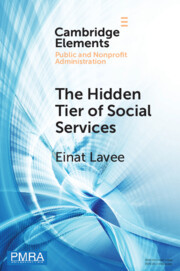Refine search
Actions for selected content:
1 results

The Hidden Tier of Social Services
- Frontline Workers' Provision of Informal Resources in the Public, Nonprofit, and Private Sectors
-
- Published online:
- 01 August 2022
- Print publication:
- 18 August 2022
-
- Element
- Export citation
